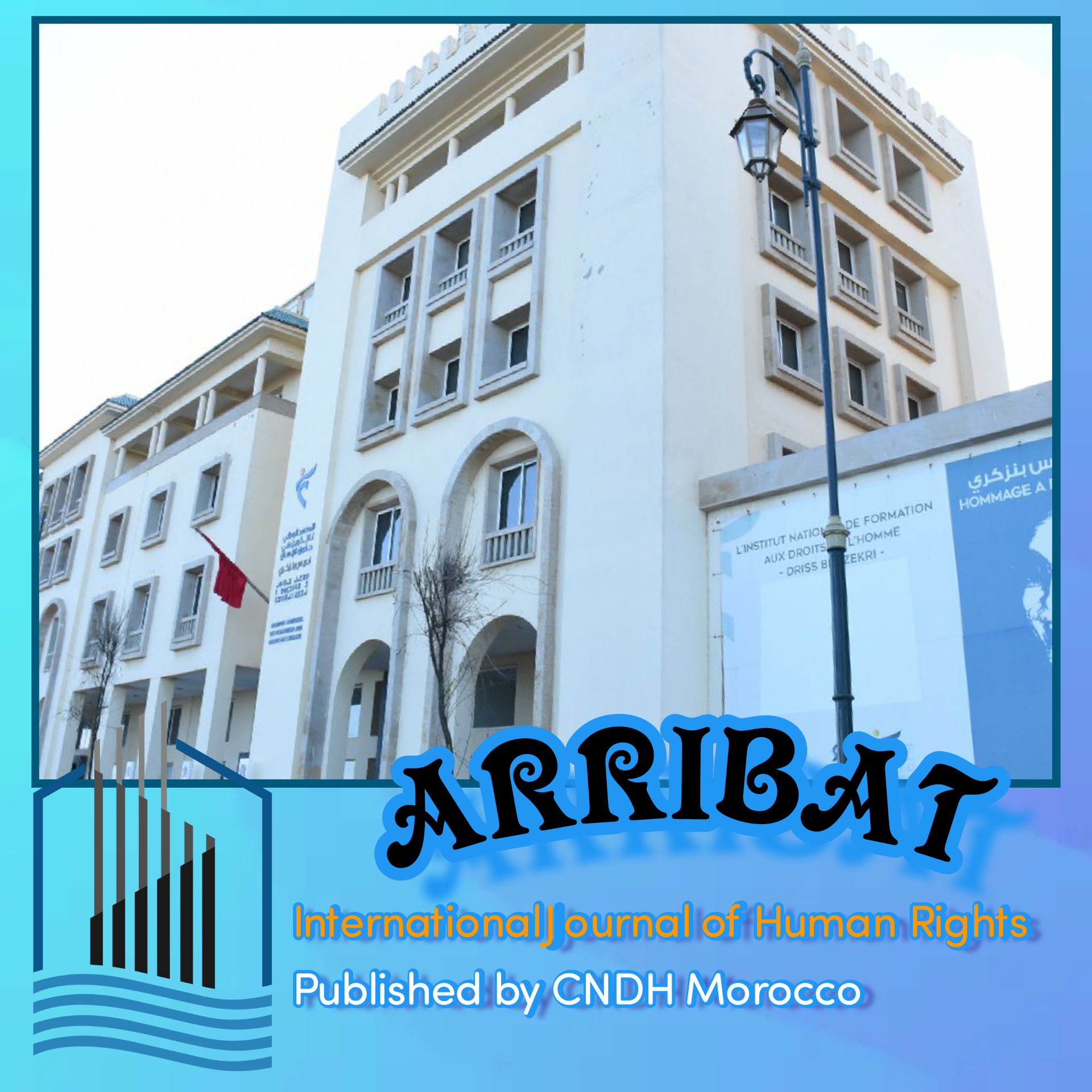Contextualised analysis of access to justice in Morocco
Leila HANAFI
Abstract
In this paper, the analysis is focused on access to justice in Morocco, with a focus on access for women. The analysis will address the historical and religious influence on the legislation in force before looking at them under the magnifying glass of international standards, in particular international human rights conventions.
Moroccan legislation, having made great progress with the Moudawana (Family Code), is a law that guarantees the minimum right of access to justice for Moroccan women. However, in view of the evolution of society and international standards, it is imperative to update this legislation to guarantee the full enjoyment of women's rights, including access to justice.
Keywords
References
[1] W. Prillaman, The judiciary and democratic decay in Latin America: Declining confidence in the rule of law, Greenwood Publishing Group, 2000.
[2] E. Wojkowska, Doing Justice: How informal justice systems can contribute, 2007.
[3] UN Women; Unicef; UNDP, Informal Justice Systems, Charting a Course for Human Rights-Based Engagement, 2012.
[4] T. Röder, "Informal justice systems: challenges and perspectives," in Innovations in Rule of Law, 2012.
[5] University of Arizona - The Center for Middle Eastern Studies, "The Culture & Arts of Morocco and the Berbers," 2012. [Online]. Available: https://cmes.arizona.edu/sites/cmes.arizona.edu/files/2.%20The%20Culture%20and%20Arts%20of%20Morocco%20and%20the%20Berbers_0.pdf.
[6] Ministry of National Education, Morocco, «National Survey on illiteracy, unschooling and de+schoolng,» 2012.
[7] UNESCO Institute for Statistics, Adult and youth literacy: National, regional and global trends, 1985–2015, Montreal: UNESCO Institute for Statistics, 2013.
[8] UNICEF, "Morocco: At a Glance," 2013. [Online]. Available: http://www.unicef.org/infobycountry/morocco_statistics.html.
[9] CNDH Morocco, "Status of Equality and Parity in Morocco: Transitional of Constitutional Objectives into Reality," Publications CNDH, Rabat, 2015.
[10] M. Demnati, "Royal Amazigh Institute: Worries for Imazighen," Amazigh Voice, vol. 10, pp. 3-4, 2002.
[11] K. Hoffman, «Berber Law by French Means: Customary Courts in the Moroccan Hinterlands, 1930-1956,» Comparative Studies in Society and History, vol. 52, n° %14, pp. 851-880, 2010.
[12] E. Culture, "The Berber People," 2010. [Online]. Available: http://www.earth-cultures.com/destinations/morocco/Berber-of-morocco.
[13] Y. Abd al-Salam, "Shia’ism in Morocco - Imam Reza Network," 2015. [Online]. Available: http://www.imamreza.net/eng/imamreza.php?id=6618.
[14] B. Maddy-Weitzman, «Ethno-politics and globalisation in North Africa: The Berber culture movement,» The Journal of North African Studies, vol. 1, n° %171-84, p. 11, 2006.
[15] L. Buskens, «Recent debates on family law reform in Morocco: Islamic law as politics in an emerging public sphere,» Islamic law and society, vol. 10, n° %11, pp. 70-131, 2003.
[16] J. Brignon, Histoire du Maroc, Casablanca: Hatier, 1967.
[17] M. -. D. d. L. Ministry of Justice and Liberties, "Code de Procedure Civile (Version consolidée en date du 6 Juin 2013). Dahir portant loi n° 1-74-447 (28 Septembre 1974)," 2013. [Online]. Available: http://adala.justice.gov.ma/production/legislation/fr/Nouveautes/codecivil.pdf.
[18] M. Hashas, Moroccan exceptionalism examined: Constitutional insights pre-and post-2011, Universitäts-und Landesbibliothek Sachsen-Anhalt, 2013.
[19] The World Bank - Legal Vice Presidency, "MOROCCO- Legal and Judicial Sector Assessment," The World Bank, 2003.
[20] S. Miller, "A history of modern Morocco," Cambridge University Press, 2013.
[21] J. Newman, "Between Feminism and Islam: Human Rights and Sharia Law in Morocco (review)," Journal of Middle East Women’s Studies, vol. 9, no. 1, pp. 130-133, 2013.
[22] L. Messaoudi, "Greatness and Limitations of Islamic Law in Morocco [Grandeurs et limites du droit musulman au Maroc]," Revue Internationale de Droit Comparé, vol. 47, no. 1, pp. 146-154, 1995.
[23] L. Weingartner, "Family Law & (and) Reform in Morocco-The Mudawana: Modernist Islam and Women's Rights in the Code of Personal Status," U. Det. Mercy L. Rev., vol. 82, p. 687, 2004.
[24] G. Peyronnie, Formal Justice in Morocco and Tribunals of Pashas and Caids: The Ancient Regime of Dahir 4-8-1918. [La justice makhzen au Maroc les tribunaux de Pacha et Caids. l'Ancien régime, du Dahir du 4-8-1918], 2013.
[25] R. Daouaji, Civil Dispute Resolution: Background and Rationale of the Duality of Jurisdiction. [Le contentieux administratif marocain: historique et fondement de la loi instituant la dualité de juridiction], PhD Thesis, Perpignan: University of Perpignan, 2001.
[26] R. Bahdi, "Background Paper on Women’s Access to Justice in the MENA Region," International Development Research Centre, Women’s Rights and Citizenship (WRC) Program and the Middle East Regional Office (MERO), Middle East and North African (MENA) Regional Consultation, 2007.
[27] B. Dupret and Y. Hounet, "Specifities and Implementation of Law in the Maghreb. [Pratique du droit et propriétés au Maghreb]," L’Année du Maghreb, no. 13, pp. 9-15, 2015.
[28] J. Abun-Nasr, A History of the Maghrib in the Islamic Period, Cambridge: Cambridge University Press, 1987.
[29] C. Pennell, Morocco: From Empire to Independence, Oneworld Publications, 2013.
[30] E. G. Ursua, Access to Justice for Women in Plural Legal Systems in Southeast Asia, UN Women, 2014.
[31] B. Tamanaha, "Understanding legal pluralism: past to present, local to global," Sydney L. Rev., vol. 30, p. 374, 2008.
[32] D. Melloni, «The 2011 Moroccan Constitution : Changes in Political and Judicial Command. [La Constitution marocaine de 2011: une mutation des ordres politique et juridique marocains],» Pouvoirs, vol. 145, n° %12, pp. 5-17, 2013.
[33] O. Bendourou, «La nouvelle Constitution marocaine du 29 juillet 2011,» Revue française de droit constitutionnel, vol. 3, pp. 511-535, 2012.
[34] Parliament of Morocco, «Official website of the Parliament,» [En ligne]. Available: http://www.chambredesconseillers.ma/en.
[35] A. Ballota, Development and Implementation of Judicial Acculuturation and Incriminating Legal Norms . [L'acculturation juridique et la norme incriminante au Maroc: Essai sur l'élaboration et l'application], PhD Thesis, Bordeaux: University of Bordeaux 1, Faculty of Law, 1982.
[36] R. Meknassi, «Social and Judicial Transformations in Morocco. [Transformations sociales et mutations juridiques au Maroc],» Dossiers du CEDEJ, pp. 60-78, 1994.
[37] United Nations Security Council, «The rule of law and transitional justice in conflict and post-conflict societies: Report of the Secretary-General. S/2004/616,» New York, 2004.
[38] Commission on Legal Empowerment of the Poor, «Making the Law Work for Everyone, Vol. 1, Report of the Commission on Legal Empowerment of the Poor,» 2008.
Publication date:
05/27/2021

